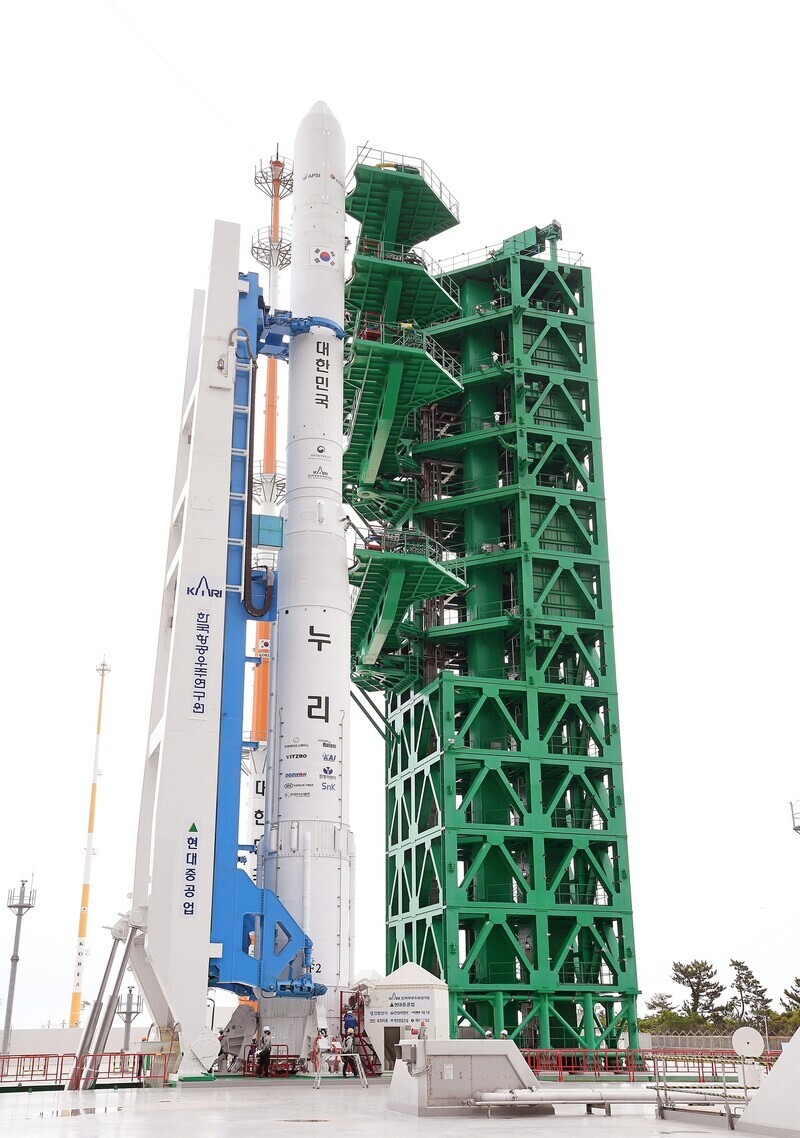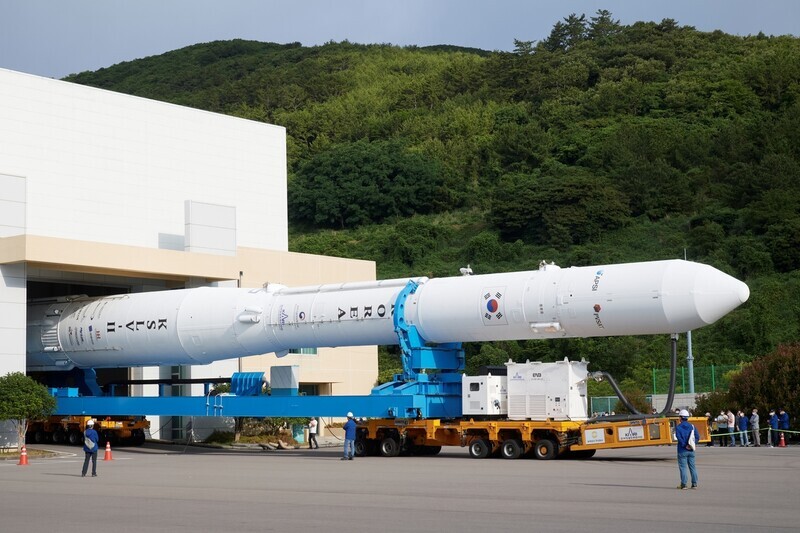hankyoreh
Links to other country sites 다른 나라 사이트 링크
Launch of S. Korea’s Nuri rocket delayed again over oxidizer tank sensor glitch

The launch of South Korea’s Nuri rocket, which was scheduled for Thursday, has been postponed once again after a sensor in its oxidizer tank was discovered to be malfunctioning during launch prep on Wednesday. The launch had been delayed by a day already due to strong winds the previous day.
The Ministry of Science and ICT and the Korea Aerospace Research Institute (KARI) announced around 5 pm on Wednesday that “while Nuri was being inspected before its launch, a sensor that detects the charging level of the oxidizer tank was discovered to be malfunctioning, as a result of which we decided to cancel Thursday’s launch.”
After the Nuri rocket was transferred to its launch pad from the assembly building, KARI erected Nuri on the launch pad, connected the rocket with electricity, and started inspecting its sensors level by level at 7:20 am. But around 2 pm, the institute discovered that the sensor that detects the charging level of its first-stage oxidizer tank did not change in value.
The ministry and KARI immediately notified the Nuri Launch Management Committee of this fact, after which the committee decided to transfer the rocket back to the assembly building and inspect it further.
Ko Jeong-hwan, the head of KARI’s rocket development operational headquarters, said, “We have to move the rocket back to the assembly building safely and go through the process of opening it up and checking it, finding the cause [of the malfunction], and deciding on next steps. The process may be quick or take some time depending on what needs repairing.”

Nuri was originally scheduled to be moved on Tuesday, but due to strong winds with a speed of 8 meters to 12 meters per second around the Naro Space Center area caused by low atmospheric pressure, its transfer was postponed by one day as a safety precaution.
“After the first launch, everyone at the headquarters did their best, and despite the one-day postponement due to weather conditions, we wanted [the launch] to go smoothly and lead to a good outcome, so it’s disappointing,” KARI President Lee Sang-ryool said. “We will do our best to determine the cause, work on the issue, and launch Nuri as soon as possible.”
Nuri was originally scheduled to launch on Wednesday with a one-week launch reserve period set for Thursday through June 23. If the cause of the sensor malfunction is determined and fixed, the rocket may be launched during the reserve period. But if the process takes longer than a week, the international community will have to be informed of a new launch date, which may cause the launch to be further delayed.
By Lee Keun-young, senior staff writer
Please direct questions or comments to [english@hani.co.kr]

Editorial・opinion
![[Editorial] Penalties for airing allegations against Korea’s first lady endanger free press [Editorial] Penalties for airing allegations against Korea’s first lady endanger free press](https://flexible.img.hani.co.kr/flexible/normal/500/300/imgdb/original/2024/0502/1817146398095106.jpg) [Editorial] Penalties for airing allegations against Korea’s first lady endanger free press
[Editorial] Penalties for airing allegations against Korea’s first lady endanger free press![[Editorial] Yoon must halt procurement of SM-3 interceptor missiles [Editorial] Yoon must halt procurement of SM-3 interceptor missiles](https://flexible.img.hani.co.kr/flexible/normal/500/300/imgdb/child/2024/0501/17145495551605_1717145495195344.jpg) [Editorial] Yoon must halt procurement of SM-3 interceptor missiles
[Editorial] Yoon must halt procurement of SM-3 interceptor missiles- [Guest essay] Maybe Korea’s rapid population decline is an opportunity, not a crisis
- [Column] Can Yoon steer diplomacy with Russia, China back on track?
- [Column] Season 2 of special prosecutor probe may be coming to Korea soon
- [Column] Park Geun-hye déjà vu in Yoon Suk-yeol
- [Editorial] New weight of N. Korea’s nuclear threats makes dialogue all the more urgent
- [Guest essay] The real reason Korea’s new right wants to dub Rhee a founding father
- [Column] ‘Choson’: Is it time we start referring to N. Korea in its own terms?
- [Editorial] Japan’s rewriting of history with Korea has gone too far
Most viewed articles
- 1Months and months of overdue wages are pushing migrant workers in Korea into debt
- 2[Editorial] Penalties for airing allegations against Korea’s first lady endanger free press
- 3Bills for Itaewon crush inquiry, special counsel probe into Marine’s death pass National Assembly
- 4Trump asks why US would defend Korea, hints at hiking Seoul’s defense cost burden
- 560% of young Koreans see no need to have kids after marriage
- 6S. Korea discusses participation in defense development with AUKUS alliance
- 7[Reporter’s notebook] In Min’s world, she’s the artist — and NewJeans is her art
- 8Korean firms cut costs, work overtime amid global economic uncertainties
- 91 in 3 S. Korean security experts support nuclear armament, CSIS finds
- 10[Guest essay] Maybe Korea’s rapid population decline is an opportunity, not a crisis